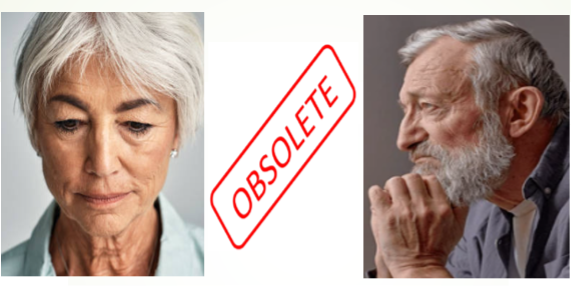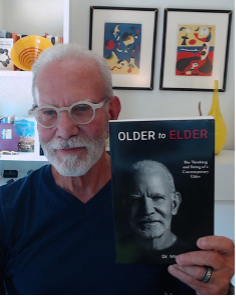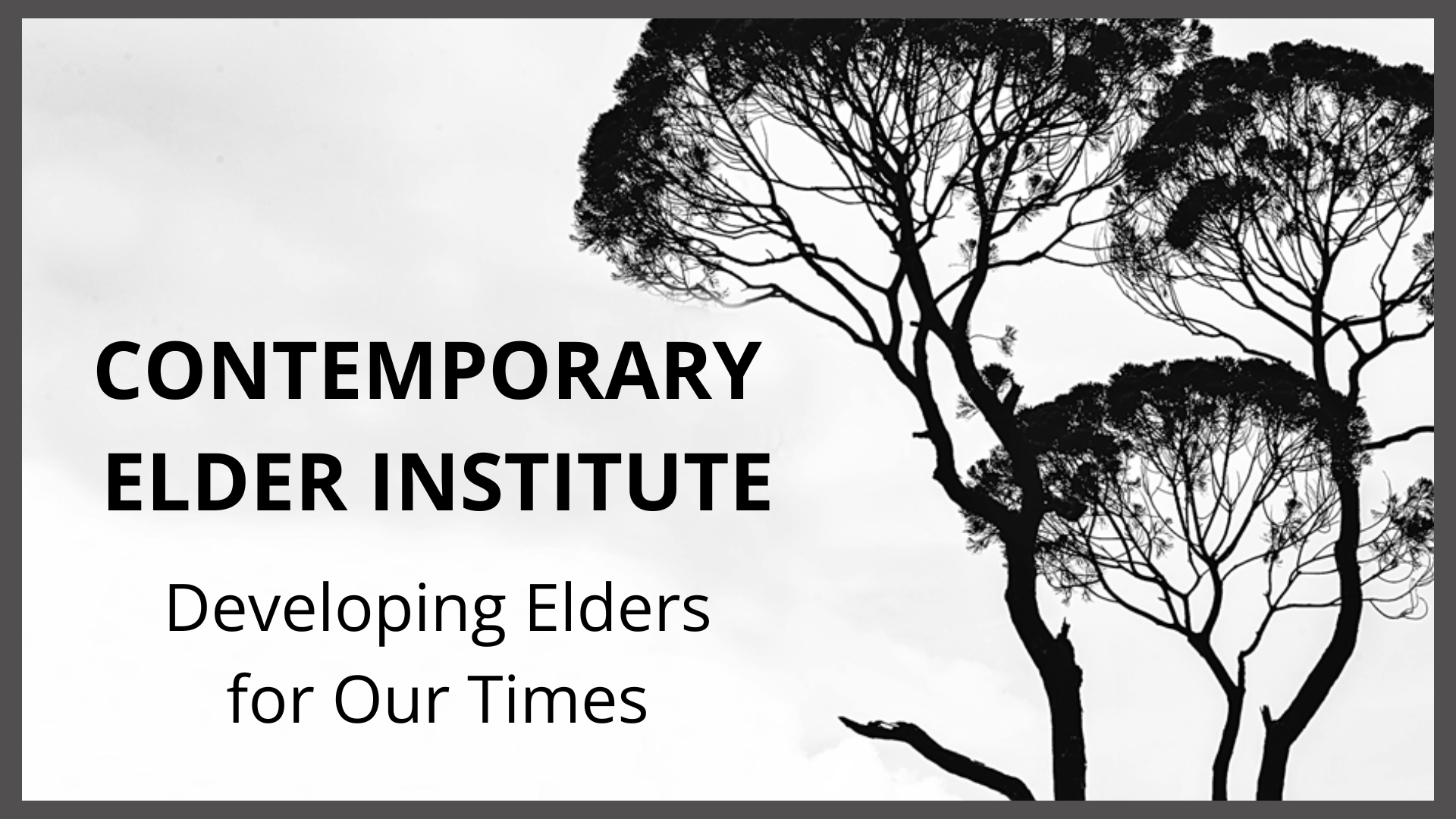Abstaining from Obsolesce
Abstaining from Obsolesce
[A 6-minute Read]

When you hit late age in our culture, you will have experiences of being marginalized, not heard, left out, discounted, and outdated. You will have emotional reactions to these experiences. Anger, sadness, depression, and fear of abandonment.
But you could tell something was coming. You were being left out of meetings. You weren't asked for input. Some of your coworkers who were there when you arrived are now gone—two of them have died. Younger employees ignore you in the hall. You find yourself eating at your desk. The requests now made of you are tactical rather than strategic. It is happening. You are being seen as old, and old is seen as obsolete.
Obsolete refers to something that is no longer in use or has fallen out of favor due to being replaced by newer, more effective, or more efficient alternatives. Feelings of being incompatible with current culture, the newest technology, popular rap music, and up-to-date fashion trends and languaging occur. Tattoos won't help. And for God's sake, don't get that earring.
Previously, the obsolescence experiences began when you were in your late sixties. But now, with the speed of change, the trajectory for being considered obsolete is even piercing the next two generations down. Technology and AI are adding rocket fuel. Moore's Law is old school; forget to double every 18 months, and now try 18 days.
In our culture, obsolescence is pinned to late age. You are seen as outdated, old-fashioned, coming from another era, no longer needed. In other words, of no use. If uselessness is firmly entrenched in the culture, it's also alive inside your head. You can't change outside, but you can change inside, which will change outside.
You are obsolete in the Western cultural context but not in another context. In this other context, there is advancement, relevancy, and aliveness. This context is the contemporary elder context.
In this context, as an elder, you now have conscious choices beyond those dictated by societal norms or stereotypes. You can create a way of being that brings peace, joy, equanimity, and higher wisdom while still operating in the larger cultural context. Elders are the small fish that swim with the sharks, which the sharks don't eat. They swim freely and happily in the water with them, gleeful in their immunity.
To create a genuine elder context, not one based on fantasy or imagination, elders think and act according to specific values. These values help them age into a more fulfilling future. Many of these values are already present but often go unnoticed, while others are newly added. But having them distinct gives them power.
WHAT ELDERS VALUE
Learning:
Elders value learning. Pursuing knowledge and understanding leads to a more profound sense of purpose and fulfillment in life. Elders keep learning because it provides continuous growth, adaptability, empowerment, creativity, resilience, fulfillment, and connection. Elders don't learn to show off, to appear more intelligent, or to be right; they learn better to understand themselves, others, and the world.
Responsibility:
Elders understand their "interpretation” of the world belongs solely to them individually. How they see themselves, how they see others, and how they see the world is up to them. They look at themselves first. They look from "I am responsible for how I respond, act, experience and interpret these experiences." I am the author, editor, and publisher of my story.
Wisdom:
Elders strive to gain higher wisdom, not conventional wisdom. Elders realize, given the speed of change, that conventional wisdom has a short life span. AI is now consuming a lot of this territory. Elders recognize the impermanence of conventional wisdom, so higher wisdom becomes their primary quest. Higher wisdom is eternal, therefore, unaffected by impermanence.
Health and Wellbeing:
Elders know their bodies are decaying, but they hold themselves responsible for the rate of decay. They don't fool themselves about the natural devolving conditions of growing old, dying and death. They are unavoidable. However, elders understand their bodies are built for obsolescence.
They have settled their relationship with their death. Their attention to their bodies doesn’t stop reverse aging. However, being an elder allows them to consciously relate to the changes, which makes all the difference.
Creativity:
Elders expand their creative outlets, such as art, music, writing, or other forms of expression that bring fulfillment and joy. They know that nesting in creativity, who they are, is happier, more at ease, and much less of a stimulus-response machine. They appreciate that creativity brings them directly into the present moment. But they’ve learned to make life a creative expression rather than it being done to them.
Impermanence:
Elders value impermanence. They have learned at the core level that the essence of anything existing in time and space will change and ultimately disappear, including themselves. That’s the law of the universe; phenomena appear, exist, change, and return to their formless origin. By definition, you are a phenomenon.
The definition of a phenomenon is “a fact or situation that is observed to exist or happen, especially one whose cause or explanation is in question.” Sounds like a human being to me.
Higher Purpose:
Elders have lived their lives following conventional goals: providing for their families, building successful careers, raising children, and being good neighbors. However, these goals lose their significance in late aging. Without a purpose, life loses its passion, direction, and sense of self-worth.
Elders have discovered how to access a higher purpose with new goals and then work at becoming capable of living that purpose and achieving those goals. A higher purpose is transformative.
Practice:
Elders value practice. Elders mean by practice engaging in various activities, disciplines, and exercises undertaken to cultivate mindfulness, wisdom, compassion, and, ultimately, enlightenment. It encompasses many methods and traditions but generally includes meditation, contemplation, yoga, and self-reflection.
These practices allow elders to accept themselves and their circumstances and navigate life with greater ease, peace, wisdom, and compassion.
Acceptance:
Elders value acceptance and practice acceptance—acknowledging and embracing the reality of a situation without trying to change or resist it. Acceptance involves recognizing things as they are, including feelings, thoughts, and circumstances, and responding to them with an open and nonjudgmental attitude. The nonjudgmental piece is what takes practice.
Operating from these values doesn't fertilize obsolescence. It’s the obsolescence’s “weed killer.” These values empower elders to live fulfilling and purposeful lives, challenging the notions of aging.
The opposite of "obsolete" is "modern," "current," "up-to-date," or "cutting-edge." These terms describe something that is contemporary, in use, and relevant to the present. Hence, the name, The Contemporary Elder Institute, seems spot on. Contemporary elders are “in use and relevant to the present.”
I CAN SEE THE FINISH LINE

Holding a book in your hand after a two-year process is a beautiful feeling. You realize a sense of fulfillment when you leaf through it for the first time. You stare at the cover, touch the bound pages, and check acknowledgments to make sure no one is left out.
Now, it is being read through by a few folks for its final inspection. The countdown has begun in earnest. Dates, materials, and people (PR, editor, publisher, coach) are all in place. Engines are firing.
The final countdown has begun. The next action steps are to realize the vision of a contemporary elder—older to elder, age to sage, purposeless to purposeful, resigned to renewed, disregarded to regarded, agitation to equanimity, fearful to fearless, withdrawn to self-expressed-Houston we have a “go.” 10…9…8…
What Is A Contemporary Elder
ANNOUNCEMENTS:
The Book:
Cover Reveal - Now
The Prelaunch of Book and Patron Invitations begins August 1st
The Public Launch (Amazon) – September 15th - October 1st
Book Stores Launch (Ingram Press) – December 1st
Podcasts, Book Signing, and Radio/TV Interviews with Marc – Beginning after Public Launch
The Sangha:
Next Sangha calls on July 24th. Guests register here.
New Sangha Website – August 1st
The Contemporary Elder Institute
No rights reserved | Take what you want
Address: Portland, OR 97210
Loreto B.C.S. Mexico 23887
